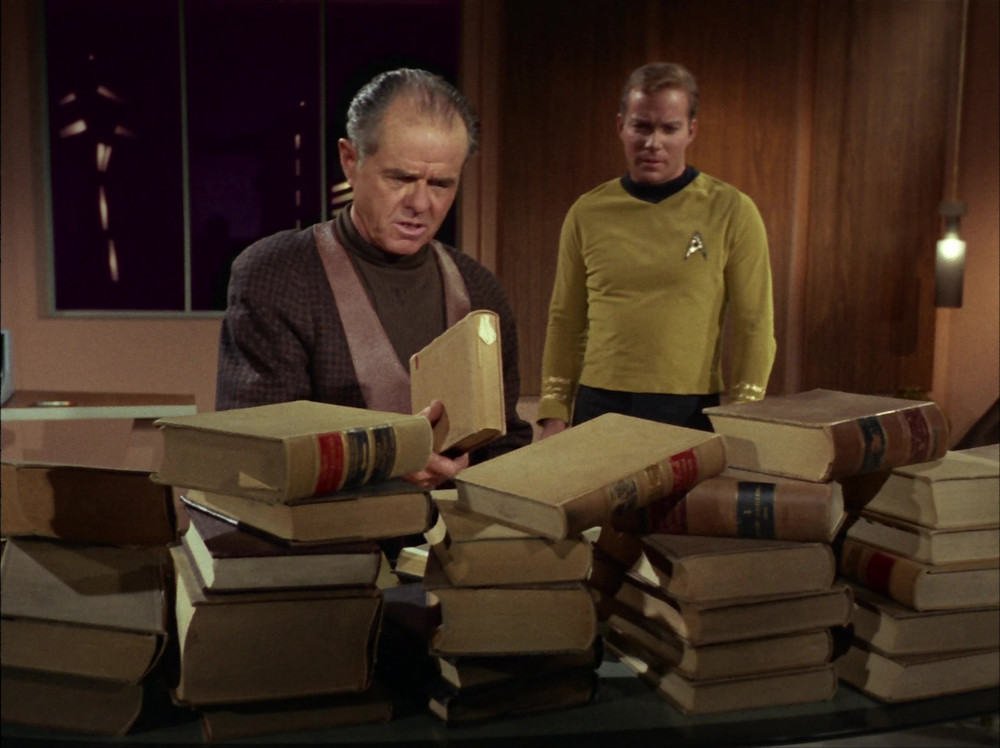Difference between revisions of "books"
m |
m |
||
| Line 1: | Line 1: | ||
{{ImageInfoBox2|file=books-tos14.jpg|caption=Books ({{TOS15}})}} | {{ImageInfoBox2|file=books-tos14.jpg|caption=Books ({{TOS15}})}} | ||
| − | {{FirstDate| | + | {{FirstDate|TOS02|1966|9|22}} |
{{Ad|AmazonTOSBD}} | {{Ad|AmazonTOSBD}} | ||
|}</div> | |}</div> | ||
{{banner|Prime}} | {{banner|Prime}} | ||
| − | Books were, traditionally, made of paper bound together, with information printed on the pages within. {{link|Prime|Starfleet Captain||Captain}} {{link|Prime|James T. Kirk||Kirk}} provided a book with data on astronomical objects, including {{link|Prime|Comet Icarus IV}}, to {{link|Prime|Starfleet Commander||Commander}} {{link|Prime|Spock}}, but Spock already had the information.<ref name="TOS09"/> {{link|Prime|Samuel Cogley}} preferred printed books to his {{link|Prime|computer}}, which he almost completely eschewed, as he believed that reading a work as originally produced could bring the reader closer to the intent of the writer.<ref name="TOS15"/> | + | Books were, traditionally, made of paper bound together, with information printed on the pages within. {{link|Prime|Starfleet Captain||Captain}} {{link|Prime|James T. Kirk||Kirk}} provided a book with data on astronomical objects, including {{link|Prime|Comet Icarus IV}}, to {{link|Prime|Starfleet Commander||Commander}} {{link|Prime|Spock}}, but Spock already had the information.<ref name="TOS09"/> {{link|Prime|Samuel Cogley}} preferred printed books to his {{link|Prime|computer}}, which he almost completely eschewed, as he believed that reading a work as originally produced could bring the reader closer to the intent of the writer.<ref name="TOS15"/> Books were also (and by the 23rd century, more commonly) available in electronic formats, and could be accessed via computers. When he gained increased mental powers from exposure to the {{link|Prime|Galactic Barrier}}, {{link|Prime|Starfleet Lieutenant Commander||Lieutenant Commander}} {{link|Prime|Gary Mitchell}} read half of the books in the {{link|Prime|U.S.S. Enterprise NCC-1701||U.S.S. ''Enterprise'' NCC-1701}}'s computer in a single {{link|Prime|day}}.<ref name="TOS02"/> |
{{References}} | {{References}} | ||
<references> | <references> | ||
| + | <ref name="TOS02">{{RefTOS02}}</ref> | ||
<ref name="TOS09">{{RefTOS09}}</ref> | <ref name="TOS09">{{RefTOS09}}</ref> | ||
<ref name="TOS15">{{RefTOS15}}</ref> | <ref name="TOS15">{{RefTOS15}}</ref> | ||
Latest revision as of 08:19, 31 August 2023
Books were, traditionally, made of paper bound together, with information printed on the pages within. Captain Kirk provided a book with data on astronomical objects, including Comet Icarus IV, to Commander Spock, but Spock already had the information.[1] Samuel Cogley preferred printed books to his computer, which he almost completely eschewed, as he believed that reading a work as originally produced could bring the reader closer to the intent of the writer.[2] Books were also (and by the 23rd century, more commonly) available in electronic formats, and could be accessed via computers. When he gained increased mental powers from exposure to the Galactic Barrier, Lieutenant Commander Gary Mitchell read half of the books in the U.S.S. Enterprise NCC-1701's computer in a single day.[3]
Notes and References
- ↑ Roddenberry, Gene (Executive Producer). "Balance of Terror". Star Trek, season 1, episode 14 (Production number 09). Directed by Vincent McEveety. Written by Paul Schneider. Desilu Productions. 15 December 1966.
- ↑ Roddenberry, Gene (Executive Producer). "Court Martial." Star Trek, Season 1, Episode 20 (Production 15). Directed by Marc Daniels. Story by Don M. Mankiewicz. Teleplay by Don M. Mankiewicz and Steven W. Carabatsos (Teleplay). Desilu Productions, 2 February 1967.
- ↑ Roddenberry, Gene (Executive Producer). "Where No Man Has Gone Before". Star Trek, season 1, episode 3 (Production number 02). Directed by James Goldstone. Written by Samuel A. Peeples. Desilu Productions. 22 September 1966.

